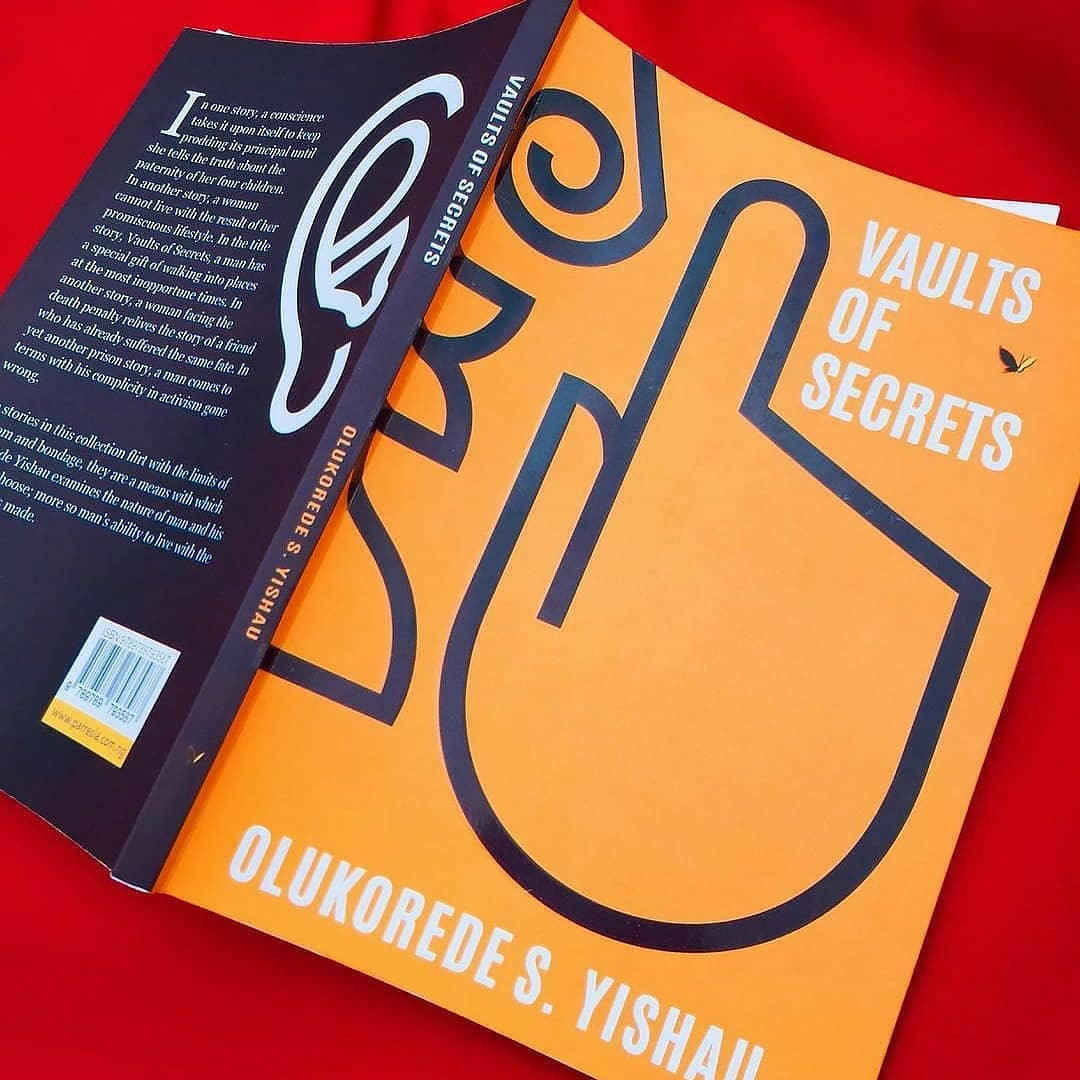BY UNAMMA UCHECI
‘Vaults of Secrets’ is an extremely captivating collection of 10 stories centered around secrets. It sheds light and perhaps serves as a reminder that we all have secrets that may interfere with our daily lives and possibly ruin us at some point in our lives.
With themes around cultism, incest, infidelity, domestic violence, I got the chills so many times from some of the stories in this book; the cliffhangers were frustrating too. It completely blew my mind and managed to surpass my expectations by far. There’s a richly developed plot for each story. It will keep you on edge yet entertained.
The clarity and flow of the author is admirable. The English was simple yet eloquent. It didn’t have ambiguous words that will have you looking through your dictionary every 5 seconds. The use of precise words for each situation was impeccable. The eagerness to know the secret in each story will come at you like a child in a candy store. Each chapter will leave you anticipating about the next secret to uncover. Some stories start out strange and get stranger, in a good way of course. I also love how unconventional the titles of the chapters are.
Advertisement
This is Olukorede’s second book, but he has complete control of his story and style. It’s the kind of book that has you thinking the author has published so many books for so many years. He sure has a unique writing style. I first noticed in his debut novel, “In the Name of our Father”, where he created a story inside a story. He has a way of transporting you into stories with his words.
One of my favourite things about this author is how he creates wonderfully nuanced and complicated, yet relatable characters. The lessons to take from some stories in this book are very much powerful. All the scenes were written so well and clawed out the right emotions in me.
“Special gift” was particularly spectacular. It tells us the story of a young self acclaimed gifted journalist who in the course of running errands for his arrogant boss, discovers a secret that could leave his friend in emotional shambles. This book turned me into a theorist. It had me questioning if it was a fiction or non fiction, primarily because some names mentioned in this story were non fictional characters. It took me to the streets of Lagos and back. I also loved that it was written in the first person narrative, which is my favourite writing style.
Advertisement
In “Till we meet to part no more” , a victim of infidelity and an accused of murder reminisces memories of her deceased friend whom she connected with in prison.
This story has two stories woven into one. You’ll come to know about Kemi’s story from Elizabeth’s point of view but you’ll also catch a glimpse of Elizabeth’s story as the narrator. I love that this story subtly pointed out a few things that go on in the Nigerian prison. Like “special gift”, this story was written in the first person, and it shows us that friendship and bonds can be created in places we least expect.
In “My Mother’s Father is my Father”, a young man discovers that his grandfather doubles as his biological father too. This very secret proved to be a burden that constantly overweighted him and even interfered in his personal life.
Even though I know incest is quite real, reading it made me cringe in disgust but at the same time, I was a bit satisfied and ecstatic because not many stories shed light on the problem of incest. These are problems we have refused to talk about as a society, despite knowing it happens.
Advertisement
“Letters from the basement” takes us through the story of an ex-governor sent to prison for funding treasonable acts against his country, leaving his family to start afresh in a new country. I must admit the love between the couple was admirable; the love letters are a bit mushy if you aren’t a hopeless romantic like me, but I can’t even fault them for the effort. I also like the fantasy this story creates for an average Nigerian; that a top government official can do time for his/ her crime.
“This Thing Called Love” tells the story of a wrongfully convicted young lady who got help from the person she least expected. It also paints us the story of her father who mysteriously went missing the very same day she returns from the U.S., leaving her haunted with guilt about the possibilities of what happened to him. You’ll get to see another story of incest in “This Thing Called Love”.
Initially, I had mixed feelings about this story being written in the second person narrative. If I’m being honest, I’m not quite used to the second person narrative. I’ve always found it a bit difficult to follow, but to see it succinctly portrayed in this story was refreshing.
“Better than the Devil” reminds us that you can always run from your past, but you may never outrun it and one day it will catch up with you. A university cultist graduates from law school ready to start his new life when his past came knocking, literally.
I felt a bit of pity for Micheal, but at the same time, I am glad his karma visited him in form of restlessness and guilt. I’m sure he thought cultism ended on campus and once you graduate, you’ll have a new life waiting for you. But a deal with the devil never ends, there’s no out, he’ll always come knocking. It is disheartening to think that Michael’s story may just be the reality of some people we hold in high esteem. Like “Till We Meet to Part No More” and “Special Gift”, this was written in the first person narrative.
Advertisement
“Otapiapia” takes us through the life of an adulterous couple. A woman dealing with infidelity and absence of her husband, finds solace in the arms of random men. She continues this way until she contracts AIDS from one of her lovers. Unable to live with the stigma, she commits suicide.
This was written in the third person narrative which made it fair to judge every character without bias. At first I wondered why Rebecca wouldn’t practice celibacy in the absence of her husband who I initially thought to be a saint. But then her actions even though immoral began to make a bit of sense when it was revealed that he too, was far from being the saint I thought he was. “Otapiapia” will show you the ups and downs of some marriages, which many unfortunately do not survive.
Advertisement
“When Truth Dies” is my favourite story in this collection, albeit I was frustrated with the end. A widow having relocated a month after her husband’s death is shocked to see her supposedly dead husband with her Indian neighbour. Set on discovering the truth, she engages her neighbour in a plan that will help her unravel the truth.
I had so many questions left unanswered. It felt like the author left us to play around with our imagination of how the story ends. I really wanted her to find closure, but in reality we don’t always get closure. We don’t always get our happy ending, which makes it more relatable than the average fiction.
Advertisement
“Lydia’s World” tells the story of two babies switched at birth; an act that would later lead to unfortunate events.
This is my second favourite story in this collection. Lydia’s story is heart wrenching. I only felt better when I remembered she was merely a fictional character. That is what Olukorede’s writing will do to you. You’ll get the opportunity to feel the story. I felt she deserved better than everything that happened to her.
“Open Wound” takes us through the journey of a rich girl and a poor boy which sounds cliche judging from that line, but very far from being one. A young boy saves a girl from an accident; an act that birthed a friendship that blossomed into lust and perhaps love, depending on the angle you choose to see it from. They were forced to part ways after Dazini left for college in the US and upon her return, they ignited their lost flames despite having marital partners; a decision that would cost both of them heavily. This story was unconventionally narrated in the third person.
Advertisement
This book will leave you in awe of the author’s writing style and ability to express prominent emotions. ‘Vaults of Secrets’ is a book with a thrilling concept at its core. The author’s narration was facile. You don’t need to struggle to believe the stories. There was no need to persuade a reader on the validity of an issue.
Stories are all original. The dialogues and monologues were striking. This book definitely stands out from what you’ve been used to, It truly deserves all the attention it gets. I would gladly recommend it any time and any day.






